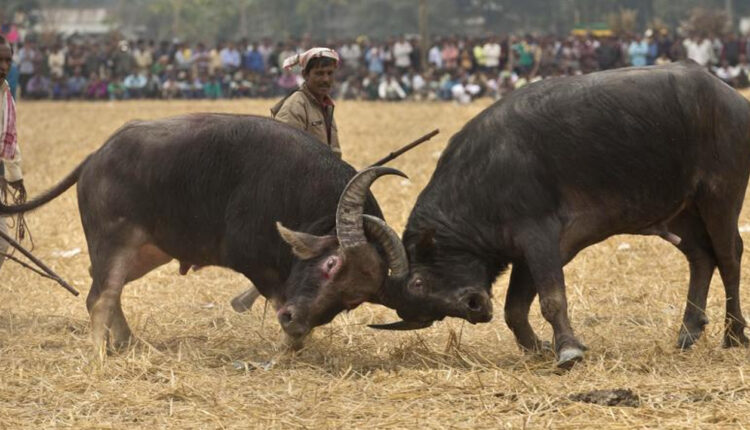Today, the Gauhati High Court, in response to PETA India’s application for interim relief, directed concerned district administrations to stop any further buffalo fights (Moh-Juj) from taking place in the state of Assam. Hon’ble Justice Manish Choudhury observed that any buffalo fights held in Assam after 25 January 2024 are prima facie illegal, as they are in violation of the time limit for holding such events imposed by the standard operating procedures (SOP) issued by the Assam government allowing Moh-Juj events. In particular, authorities of Nagaon district were directed to stop a buffalo fight scheduled to take place this weekend on the basis of evidence produced by PETA India. While proceedings in relation to PETA India’s plea for the state’s decision to allow such events to be deemed unconstitutional are to be decided, the court has ordered strict enforcement of the government’s SOP in the interim. In addition, the court directed the state to file an action taken report by Tuesday, 6 February.
Following the Assam government’s decision to allow buffalo fights, PETA India filed a petition with the Gauhati High Court making the case for the cruel spectacles to be prohibited once again. PETA India’s petitions cite numerous violations of central law in the conduct of these events. As evidence, PETA India submitted investigations into these fights, which reveal that terrified and severely injured buffaloes were beaten to force them to fight.
An investigation into a buffalo fight held in Ahatguri in the Morigaon district of Assam on 16 January revealed that to instigate buffaloes to fight, owners slapped, pushed, and shoved them; jabbed and struck them with wooden sticks; and pulled them by their nose-ropes to force them to approach one another. When fights were underway, some owners and handlers jabbed the buffaloes with sticks and whacked them with bare hands to cause them further distress. The buffaloes locked horns and fought, sustaining bloody wounds to their necks, ears, faces, and foreheads – many had injuries all over their body. The fights lasted until one of the two buffaloes broke away and fled.
Photographs of the investigated events can be found here, and video footage can be found here.
Owners and handlers dragged buffaloes around using ropes threaded through their sensitive nostrils. Some buffaloes’ nostrils bled due to yanking, and many repeatedly licked their nostrils in an attempt to relieve the pain. No shade, water, or food was provided for the buffaloes during the fight, a violation of the SOP issued by the Government of Assam.
Some owners forced the animals to fight in the spectator stands while the official fights were held in the arena. These unsanctioned fights increased the risk of buffaloes injuring or trampling human spectators.
“PETA India thanks the Hon’ble Gauhati High Court for directing that unauthorised buffalo fights be immediately stopped in Assam, with action taken against the organisers,” says PETA India Advocacy Associate Tushar Kol. “We hope the court will recognise that this cruelty is a clear violation of central law and prohibit these violent fights.”
PETA India’s petition to the High Court points out that buffalo and bulbul fights violate the Constitution of India; The Prevention of Cruelty to Animals Act, 1960; and judgements of the Hon’ble Supreme Court of India, including in Animal Welfare Board of India vs A Nagaraja. The group also notes that such fights are inherently cruel, cause immeasurable pain and suffering to the animals forced to participate, and contradict the tenets of ahimsa (non-violence) and compassion, which are integral to Indian culture and tradition. Allowing these events to continue is a regressive step which threatens to undo almost a decade of progress in human and animal rights.



